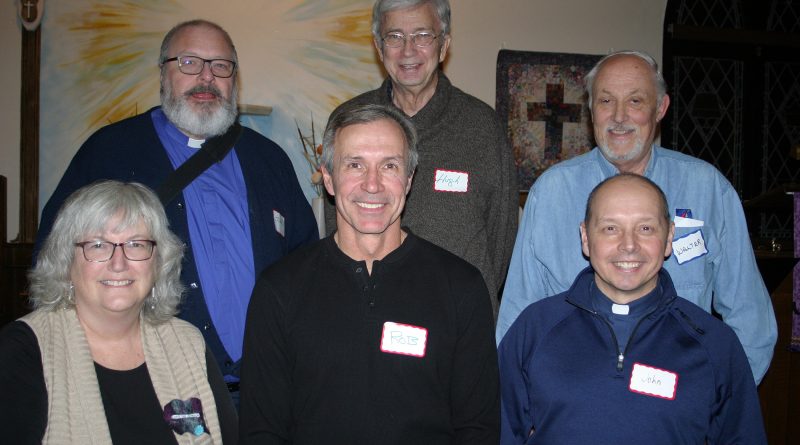Putting faith in disaster recovery
By Jake Davies - West Carleton Online
FITZROY HARBOUR – Despite all the goodwill intended behind the sentiment ‘if you need anything, give me a call,’ the phrase, heard often during the aftermath of our three recent natural disasters, provided no comfort to those dealing with recovery.
“You can’t take the time to call,” Judy Roesler said. “You just keep going and going and going.”
Judy and her husband Rob, Willola Beach residents, were sharing the memories of their personal experiences of last spring’s historic extreme flooding. Willola Beach was hit hard. For more than 26 days the flood water exceeded the height of the previous record-breaking flood only two years earlier. The Roeslers are still recovering and talking about it is still very hard for Judy to do.
“I can’t do it and I don’t know why,” she told the roughly 22 in attendance at the Ecumenical Consultation on Emergency Needs held at the Bethel-St. Andrews United Church last Thursday (Nov. 28). “I don’t know why – we didn’t lose anything. Just the cottage. It’s hard.”
Rob and his wife have spent the summer cleaning up the property.
“The aftermath. I still have three out-buildings filled with mud,” he said. “I haven’t gone back there. The depression. We didn’t really take a beak until mid-August. People need a break. Even if it’s just to go to the movies.”
The Roeslers were two of a number of speakers, sharing their experiences with the Ecumenical Disaster Planning committee of Fitzroy Harbour – the group hosting the meeting. The committee is made up of representatives of West Carleton’s Christian faiths including the Catholic, United and Anglican churches.
The committee is comprised of Walter Veenstra, Rob Roesler, Rev. Dr. Christine Johnson, Tom Jones, Father John Stopa, Hugh O’Donnell, and Father John Orban.
The purpose of the meeting was to hear from those affected by the recent floods and tornado to better understand the community’s emergency needs and how as faith communities, they can be better prepared in the future.
“When we look at history, we know in communities like this we would hear church bells and find sanctuary in the churches. The government has taken over that role and we’re wondering what we can do. As a community, we have to figure out where we fit in.”
– Committee chair Walter Veenstra
“We’re here to learn tonight,” Veenstra said. “When we look at history, we know in communities like this we would hear church bells and find sanctuary in the churches. The government has taken over that role and we’re wondering what we can do. As a community, we have to figure out where we fit in.”
The committee feels it can be more helpful by combining the might of all the Christian churches in West Carleton.
“We rely on the government to solve all our problems,” Veenstra said. “We’ve taken a step backwards and maybe we need to take a few steps forward.”
So, Thursday’s meeting was a first step for the committee, a chance to learn from those who experienced first-hand one (if not more) of West Carleton’s three natural disasters in the last three years.
“The main purpose tonight is to listen,” said Rev. Dr. Christine Johnson, the reverend at Bethel-St. Andrews. “To identify the physical, mental and spiritual needs that weren’t met in the effect or after-effect of those disasters. We’re not here to hear complaints. We’re here tonight to hear how you were affected on the ground. Why do we care? Our faith teaches us to love our neighbour. It’s not about conversion. It’s about serving the community and loving our neighbours.”
The first the committee would hear from were Phil and Tonja Aldis. The Aldis were not in attendance due to another commitment but the Constance Bay residents wrote a letter which Johnson read. Not surprisingly, communication was an issue in the early days of the flood.
“Being in the evacuation zone made it hard for people to reach us,” Tonja wrote. “It was a very long flood. Emotionally draining. There were always emergency texts throughout the night. People needing food, needing water, needing gas.”
A drop off station was set up at the border on Bayview Drive where vehicles were no longer allowed to enter or leave that section of road. Power had been cut off and emergency vehicles were no longer allowed to navigate the road due to the deep water. It became a depot for supplies like food, gas, water, sand, sandbags even emotional support.
If a resident left the cordoned off area in their vehicle, they would not be permitted back in.
Tonja was another of those affected by well-meaning, vague offers of assistance.
“It was stressful when people would tell us to just call if we needed help,” she said. “That was hard to do.”
Constance Bay’s Jim Armstrong was the first at the meeting to speak. The Constance Bay resident lives at the south end of Allbirch Road near the creek.
“We became very popular because we had food,” he said. “Guess where it came from? The church.”
One night the Armstrongs served 30 people in their driveway. Another night some person dropped off 17 pizzas at the house.
Armstrong was better prepared for the 2019 flood after going through the 2017 one.
“Because we knew it was coming and could sandbag on dry land,” he said.
Armstrong’s neighbour wasn’t as lucky.
“Hi is a volunteer firefighter. He lost his house to fire,” Armstrong said. “He’s had a devil of a time rebuilding with permits and regulations etcetera.”
Rob, and later his wife joining him, spoke after Armstrong.
“I was away when it started,” he said. “It’s not going to flood in April.”
He was wrong and when he got back he needed help. Rob, a recreational athlete, contacted his hockey and soccer teams, many who came out to help. Rob said farmers with tractors came out of nowhere.
“These people just knew to come,” he said. “It was greatly appreciated. This was a long flood. A lot of sleepless nights, anxiety, mayhem.”
Having some assistance was critical to his mental health.
“When you have someone, you can let your guard down a bit,” Rob said. “Communication was slow to begin. It was needed. I didn’t know there were dinners coming. Where help was coming from.”
The Roeslers ended up racking up quite a take-out bill.
“There was no time to cook. If you couldn’t provide your volunteers with food, you would lose them, and you didn’t know if they would be coming back.”
– Willola Beach resident Judy Roesler
“We had to order out all the time,” Judy said. “There was no time to cook. If you couldn’t provide your volunteers with food, you would lose them, and you didn’t know if they would be coming back.”
They spent six weeks surrounded by the Ottawa River. But she knows she had it better than some of their neighbours.
“People had to walk away from their homes because they didn’t know what to do,” she said. “It was very tiring, and depressing, and hard.”
Fitzroy Harbour resident Bruce Collier was also away when the flood started in 2019. It was the third the Willola Beach resident has experienced – 1979, 2017 and 2019.
After his house flooded in 2017, he built a retaining wall. In 2019, the water raised so much, it went around the retaining wall.
“I was on vacation,” he said. “My biggest problem was not knowing. I got back April 29. I have to thank my neighbour Mike (Campbell) for saving my house. A bunch of other neighbours helped. My house was an island.”
He had to evacuate his two cats by boat and stayed at Campbell’s parents, who lived across the road on slightly higher ground, for 33 days. Collier had cameras set up so he could monitor his sump pumps.
“We didn’t know if Hydro was going to cut us off,” Collier said. “That was a big, big fear. We never knew what was going to happen the next day, when we could go back, if the city was going to help.”
The one thing Collier does know is he has to be prepared.
“We’re trying to figure out what we’re going to do for the next flood,” he said. “It’s going to happen.”
There were tornado victims in attendance as well.
Dunrobin’s Adele Muldoon was in attendance. She almost lost her husband Leo in the tornado. Leo was in the barn on a ladder when the tornado hit. It threw him hard to the ground and caused serious injuries.
“I went to the hospital with Leo,” she told the committee. “I was told I should have my family there. They didn’t think he was going to make it through the night.”
Things didn’t get easier for Adele when she finally headed home, leaving her husband in the hospital. Police wouldn’t let her back in to her Dunrobin Road home – the whole community was closed to civilians, whether they lived there or not.
“There was nobody there that I knew. I spent my whole life in Dunrobin and I didn’t recognize anyone. There was no one I could talk to.”
– Dunrobin resident Adele Muldoon
“They made me check in to the school (West Carleton Secondary School which was acting as the emergency shelter),” Adele said. “There was nobody there that I knew. I spent my whole life in Dunrobin and I didn’t recognize anyone. There was no one I could talk to.”
Adele didn’t realize the help she needed, even as Leo recovered and got stronger over the year.
“I was going to be strong,” she said. “I thought we were getting though it. I didn’t realize until two weeks ago when I woke up and I felt different.”
She said it was a change for the better she didn’t know she hadn’t reached yet – more than a year after the tornado. In the immediate aftermath of the tornado, she constantly refused help.
“My reaction was always someone needed help more,” she said. “You have to look for the exceptions to the rule. There are people who now live far away and there’s no way people can check on them.”
Adele thought the creation of a log of those affected by these disasters would help the community keep better track of their fellow neighbours. She also hopes a better plan will be created for dealing with the actual disaster.
“I don’t know how many times we can go through a crisis and rely on volunteers,” she said. “We need to educate people. We were fortunate there weren’t more injuries.”
Adele was impressed (as was everyone) with the speedy creation of West Carleton Disaster Relief (WCDR) and applauded its buddy system of providing a single point of contact through volunteer families with those in need.
“At the time I said no, but when I look back, I could have used that help,” she said. “When I knew Leo wasn’t going to die, I felt blessed. I realized all those months I was suffering from something, although I didn’t know what I was suffering from. We’ve had our warning. Now we have to be prepared.”
Veenstra wasn’t a victim of the disasters, but spent every day following the flood volunteering his time, helping who he could, which included daily visits to those on Ground Zero.
“I could sandbag for four hours and then I was done. I felt guilty that I wasn’t doing enough. I still feel guilty, even driving here tonight.”
– Committee chair Walter Veenstra
“As a volunteer I felt a huge amount of guilt,” he said. “I could sandbag for four hours and then I was done. I felt guilty that I wasn’t doing enough. I still feel guilty, even driving here tonight.”
Dunrobin Community Association, and later, WCDR co-chair Greg Patacairk became the face and the voice of the tornado crisis. He was in the news on an almost a daily basis, providing updates and progress reports during the immediate aftermath of the tornado. He didn’t lobby for the job, he was just in the wrong place at the wrong time.
“People just kept coming to me, what do I do? What do I do? What do I do,” he said. “When I got home that night I cried a lot, I prayed, I meditated. The next day I went to the school and just helped. I didn’t know what I was doing, but I was willing to try.”
There were three other speakers who helped how they could including barbecuing daily in Fitzroy Provincial Park during the flood, or leading the search for lost items and the clean up of some of Dunrobin’s least accessible areas.
As of last week, Coun. Eli El-Chantiry says there are more than 100 famillies who have not been able to return to their homes due to last spring’s flood. There are still a number of families displaced from the 2018 tornado. That number is a little harder to pin down, but it is expected some of those community members will never return.
“I thank each and everyone one of you for your stories,” Fr. John Stopa said. “You represent thousands of people. I guarantee something will come of this. We’re going to do something that is needed, that is wanted and will be valued by the community.”
“Thank you for sharing your vulnerabilities,” Fr. John Orban said. “We needed that. It’s good to listen and hear what you are saying.”
For our extensive flood coverage, click here.
For our extensive tornado coverage, click here.












Pingback:Bethel-St. Andrew's United Church – Putting Faith in Disaster Recovery
Pingback:West Carleton Online’s Top 10 in 2019 – West Carleton Online